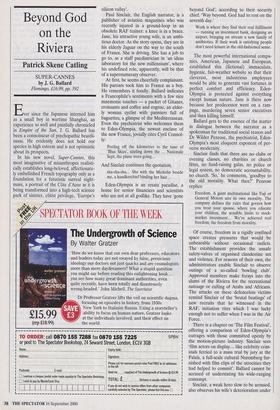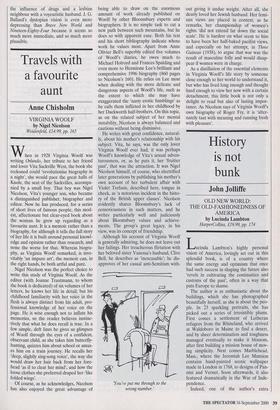Beyond God on the Riviera
Patrick Skene Catling
SUPER-CANNES by J. G. Ballard Flamingo, f16.99, pp. 392 Ever since the Japanese interned him as a small boy in wartime Shanghai, an experience so well and painfully chronicled in Empire of the Sun, J. G. Ballard has been a connoisseur of psychopathic beastli- nesss. He evidently does not hold our species in high esteem and is not optimistic about its prospects.
In his new novel, Super-Cannes, this most imaginative of misanthropes realisti- cally establishes long-beloved, affectionate- ly embellished French topography only as a foundation for a futuristic surreal night- mare, a portrait of the Cote d'Azur as it is being transformed into a high-tech science park of sinister, elitist privilege, 'Europe's silicon valley'.
Paul Sinclair, the English narrator, is a publisher of aviation magazines who was recently injured in a ground-loop in an obsolete RAF trainer: a knee is in a brace. Jane, his attractive young wife, is an ambi- tious doctor. As the story opens, they are in his elderly Jaguar on the way to the south of France. She is driving. She has a job to go to, as a staff paediatrician in 'an ideas laboratory for the new millennium', where his undefined role, apparently, will be that of a supernumerary observer.
At first, he seems cheerfully complaisant. His parents took him to France as a boy. He remembers it fondly. Ballard indicates a Francophile's sentiments with a few nice mnemonic touches — a packet of Gitanes, croissants and coffee and cognac, an elder- ly woman cyclist with panniers full of baguettes, a glimpse of the Mediterranean. Even the psychiatrist who welcomes them to Eden-Olympia, the newest enclave of the new France, jovially cites Cyril Connol- ly: Peeling off the kilometres to the tune of `Blue Skies', sizzling down the ... Nationale Sept, the plane trees going...
And Sinclair continues the quotation, sha-sha-sha... She with the Michelin beside me, a handkerchief binding her hair...
Eden-Olympia is an ersatz paradise, a home for senior financiers and scientists who are not at all godlike. They have 'gone beyond God', according to their security chief. 'Way beyond. God had to rest on the seventh day.'
Work is where they find their real fulfilment — running an investment bank, designing an airport, bringing on stream a new family of antibiotics. If their work is satisfying people don't need leisure in the old-fashioned sense.
The most powerful international compa- nies, American, Japanese and European, established this (fictional) immaculate, hygienic, fair-weather website so that their cleverest, most industrious employees would be able to generate vast fortunes in perfect comfort and efficiency. Eden- Olympia is protected against everything except human nature. Jane is there now because her predecessor went on a ram- page, murdering seven senior executives and then killing himself.
Ballard gets to the essence of the matter in dialogue between the narrator as a spokesman for traditional social reason and Dr Wilder Penrose, the psychiatrist, Eden- Olympia's most eloquent exponent of per- verse modernity.
Sinclair finds that there are no clubs or evening classes, no charities or church fetes, no fund-raising galas, no police or legal system, no democratic accountability, no church. 'So,' he comments, 'goodbye to the old morality. What then?' Penrose replies: Freedom. A giant multinational like Fuji or General Motors sets its own morality. The company defines the rules that govern how you treat your spouse, where you educate your children, the sensible limits to stock- market investment... We've achieved real freedom, the freedom from morality.
Of course, freedom in a rigidly confined space creates pressures that would be unbearable without occasional outlets. The establishment provides the unsafe safety-valves of organised clandestine sex and violence. For reasons of their own, the administrators enable Sinclair to observe outings of a so-called 'bowling club'. Approved members make forays into the slums of the Riviera for the recreational ratissage or culling of Arabs and Africans. The attacks on these defenceless victims remind Sinclair of the 'brutal beatings' of new recruits that he witnessed in the RAF, initiation rites which I was lucky enough not to suffer when I was in the Air Force.
There is a chapter on 'The Film Festival', offering a comparison of Eden-Olympia's outrages with those committed openly by the motion-picture industry. Sinclair sees `film actors on display... like celebrity crim- inals ferried to a mass trial by jury at the Palais, a full-scale cultural Nuremberg fur- nished with film clips of the atrocities they had helped to commit'. Ballard cannot be accused of understating his wide-ranging contempt.
Sinclair, a weak hero slow to be aroused, also observes his wife's deterioration under the influence of drugs and a lesbian neighbour with a voyeuristic husband. J. G. Ballard's dystopian vision is even more depressing than Brave New World and Nineteen-Eighty-Four because it seems so much more immediate, and so much more plausible.



































































 Previous page
Previous page